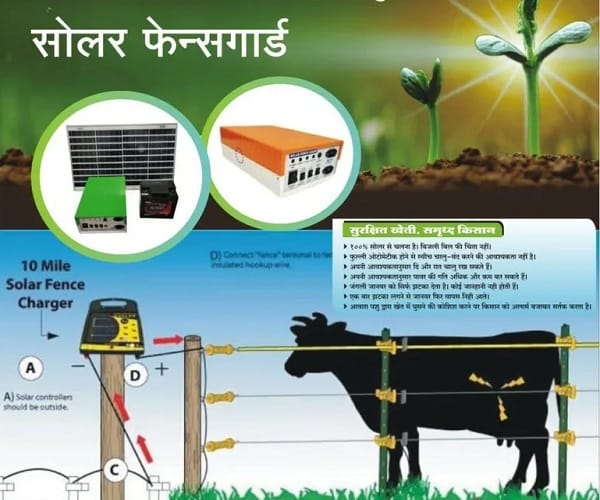Maintaining Your Solar Jhatka Machine: Battery Care & Season‑Wise Tips
A Solar Jhatka Machine (also known as a Zatka machine or solar fence energizer) is a critical tool for protecting your crops from wild animals like monkeys, wild boars, and stray cattle. To ensure uninterrupted operation and a long service life, regular maintenance is essential, especially for the battery and wiring components. In this guide, we will cover battery care, cleaning, and season-wise maintenance tips for farmers using solar fencing in India.
1. Battery Care
The battery is the heart of a solar Jhatka machine. Without a healthy battery, the energizer cannot deliver consistent pulses, especially during cloudy days or at night.
Types of Batteries
- ✅ Lead-Acid Battery: Common, affordable, requires periodic topping of distilled water.
- ✅ Sealed/VRLA Battery: Maintenance-free, spill-proof, ideal for small to medium installations.
- ✅ Lithium-Ion Battery: High efficiency and long life, but expensive.
Battery Maintenance Tips
- 🔋 Check battery voltage weekly. A fully charged 12V battery should read around 12.6–12.8V at rest.
- 🔋 For lead-acid batteries, top up distilled water if electrolyte levels drop below the recommended mark.
- 🔋 Keep battery terminals clean and free of corrosion. Use petroleum jelly or anti-corrosion spray.
- 🔋 Ensure the battery is connected to the charge controller properly with correct polarity.
- 🔋 Replace batteries after 2–3 years or when capacity drops below 60–70%.
2. Solar Panel Maintenance
Solar panels power your Jhatka machine during the day. Keeping them clean and correctly positioned ensures optimal energy generation.
- ☀️ Clean panels monthly with a soft cloth and water; avoid harsh chemicals.
- ☀️ Keep the panels free from dust, bird droppings, or leaves.
- ☀️ Ensure panels face south (in India) and are tilted at 20–30° for maximum sunlight.
- ☀️ Check wiring and connectors (MC4 or DC cables) for wear or loose connections.
3. Fence Wire & Energizer Maintenance
- ⚡ Check fencing wires for breaks or sagging; tighten as needed.
- ⚡ Inspect insulators on poles for cracks or damage.
- ⚡ Ensure fence wires are not touching trees, plants, or grass to prevent energy leakage.
- ⚡ Test energizer output voltage using a voltmeter or fence tester every 2–4 weeks.
- ⚡ Check earth rods: in dry soil, pour water near rods to maintain conductivity.
4. Season-Wise Maintenance Tips
Summer
- 🌞 High temperatures can reduce battery life; ensure proper ventilation around the battery.
- 🌞 Check solar panels for dust and clean regularly.
- 🌞 Inspect wires for any heat-related insulation damage.
Monsoon
- 🌧️ Ensure the fence posts are stable and panels are tilted to avoid water accumulation.
- 🌧️ Check the earthing system for waterlogging or corrosion.
- 🌧️ Inspect all connectors and wires for short circuits due to moisture.
Winter
- ❄️ Reduced sunlight may lower battery charge; monitor voltage closely.
- ❄️ Ensure snow or frost does not cover solar panels (if in higher altitude regions).
- ❄️ Keep battery insulated or in a shaded box to avoid freezing (for lead-acid types).
Spring / Pre-Harvest
- 🌱 Tighten wires before crop growth accelerates.
- 🌱 Check energizer performance to prevent crop damage by animals.
- 🌱 Trim grass and vegetation along fence lines.
5. Safety Tips During Maintenance
- ⚠️ Always turn off the Jhatka machine before touching wires or battery terminals.
- ⚠️ Disconnect the solar panel or isolate it using MCBs if performing maintenance on the energizer.
- ⚠️ Use insulated tools and wear gloves when handling electrified components.
- ⚠️ Keep children and pets away during maintenance checks.
6. Common Mistakes to Avoid
- ❌ Neglecting battery checks can lead to system failure at critical times.
- ❌ Allowing vegetation to touch fence wires reduces shock efficiency.
- ❌ Using household wires or low-quality materials causes short circuits or breakdowns.
- ❌ Ignoring seasonal maintenance reduces energizer life and protection effectiveness.
Proper maintenance of your solar Jhatka machine ensures reliable crop protection, longer battery life, and uninterrupted performance throughout the year. By following these battery care and season-wise tips, farmers can prevent crop loss, minimize repair costs, and get the most out of their solar fencing investment. Regular checks, cleaning, and simple precautions are the key to a safe and effective system.
Remember: A well-maintained solar fencing machine not only protects your crops but also saves time, effort, and money while keeping wildlife unharmed.
